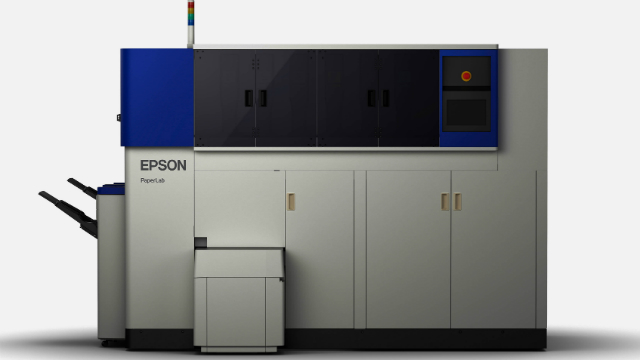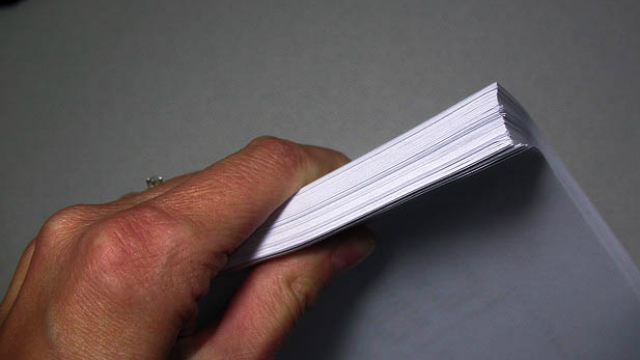PaperLab Explained
Recycling waste paper is something we do on a near-daily basis, but have you ever stopped to consider what happens to those leftover sheets after you’ve tossed them on the recycling pile? Paperlab could answer this question.
After the bin men collect your waste paper, it’s taken to a recycling plant where it’s washed, sorted and soaked in water to create a sort of paper ‘slurry’. This pulp is then used to make new paper, and resold in 100% recycled form.
This paper recycling process works a treat, and ensures that fewer and fewer trees face the chop in the name of paper production. But is there a better, more efficient way to recycle paper? Yes — and it all rests with Epson’s new ‘PaperLab’.
Unveiled at the close of 2015, the Epson PaperLab is reputed to be the world’s first automated papermaking system. Set to launch in Japan in 2016, this in-office machine is capable of turning waste paper into new paper in just 3 minutes. Yes you heard right — brilliant white, recycled paper in just three minutes.
Within this remarkably short window, this state-of-the-art device can create 14 sheets of 100% recycled paper. That means, throughout a standard 8-hour work day, the PaperLab can produce 6,720 sheets of recycled paper — enough to keep your printer stocked for months.
The machine also allows you to adjust the thickness and size of the paper you want to produce. So whether you need some standard A4 printing paper or want to create your own business cards, you can do both from the comfort of your office.
But how does the technology work? Sadly, Epson hasn’t released many details surrounding this, leaving tech experts to speculate on what’s going on beneath the bonnet of this revolutionary new device.
One thing Epson has confirmed is that the PaperLab is the first machine of its type to use a ‘dry process’ to recycle the waste paper. This differs greatly from common paper production practices, which require vast quantities of water in order to create the pulp mentioned above. By contrast, the PaperLab needs just a cup or so of water to bind the new paper fibres together — making it considerably more efficient than standard recycling techniques.
The Epson PaperLab uses a simple fiberising and binding technique to create the fresh sheets of A4, a process which is assumedly aided by some kind of reusable solvent — though Epson hasn’t released details of this. In any case, the recycling process is faster than any other device on the planet, suggesting that the machine might feature new, heavily patented technology.
Unfortunately, aside from in Japan, there’s no telling when the PaperLab might become available for general sale. And even when it does, it’s likely to be eye-wateringly expensive — with experts speculating that such high-tech equipment will set businesses back a cool £50K. For on-the-spot recycling, however, we reckon that’s a small price to pay.
For those lacking in a spare £50,000, we stock a complete range of 100% recycled printer paper in a range of different weights. To find out more, visit our homepage or call us on 0845 365 3605.
Image credits: innovate360, Walmart’s Flickr profile, Rmkoske




thanks for bringing new technology in the world, we have some demands and doubt,can you maximumise the production to 1500000/ sheets per day and cost of machine and what will be the cost of paper plus solvent(binding) which will be use per day for making 1500000/ sheets,and what gsm can the machine make of the paper minimum and maximum, and strength( bf)details.
Dear
Please let me know how many price is paperlab
I don’t think it’s actually available to purchase yet. It’s been built as a one off invention.
Dear Sir
I would like to know how I can purchase one automated papermaking system Machine. Also I wants to know:
1. What is the price?
2. What is the weight?
Looking forward to hearing from you soon.
Best Regards,
mohammad reza falatouni
Hi Mohammad, unfortunately these machines have not been released for general sale.
Dear Sir,
I m interested this product,Please inform me the price
Hi, this is only a concept product and as far as I’m aware isn’t yet available to buy.
No encuentro si Epson paper lab se esta comercializando de acuerdo a la inf. ya tiene 2 años en el mercado.Actualmente está disponible y su precio
Gracias
Hi there, I believe that the Epson Paperlab was only a concept and built as a one off machine.
Prix de A-8000 merci
Hi Yassine, this is a concept machine that can’t actually be bought so there is no price.
Hi
How about the cost for 1 gram recycle paper?
Many thanks
Unfortunately there is no info on this as it was a concept machine
hi, is the paper lab on sale now please let me know how to buy from zimbabwe
No it’s a concept machine and not won’t be made for sale
What is the Price?
This was never released beyond the concept phase so isn’t sold on the open market I’m afraid!
Hello, I have been scrolling through the comments on this article and multiple times it has been said that this product is not yet available for purchase, but I can not help but realize that many of these comments are from two or three years ago so I was wondering if the status on wether or not this product was on the market had changed.
Hi there, I don’t think the paperlab was ever actually released in the end. It never made it past the concept stage.
Is this available?
No unfortunately it was only a concept and never went into production.
hi, is the price of this machine currently available for companies? Are there models of the same type (paper recycling on site) of other brands as well? Are there more compact products or versions? thank you
Hi, this is a concept machine and I don’t believe it ever went into production unfortunately.
Please is the product on available for purchase now
Hi, no the paper lab was a concept machine and was never manufactured for sale.